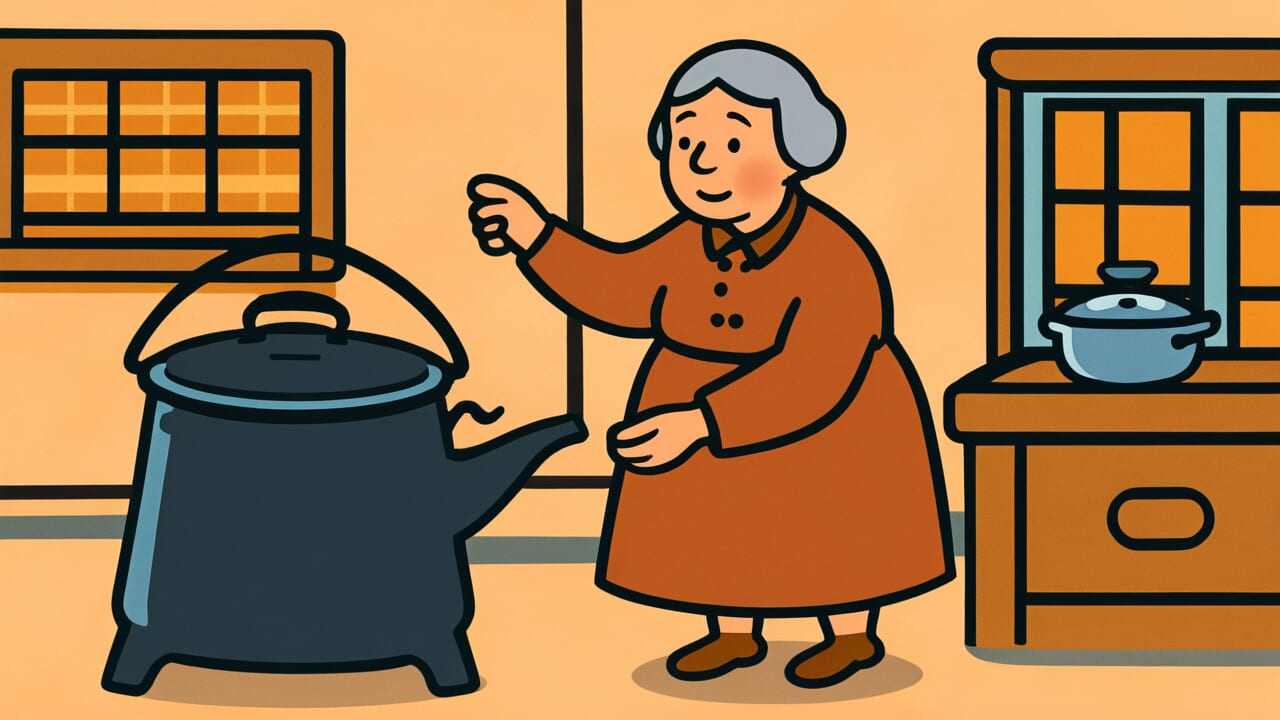How to Read “Wives and pots are better when old”
Nyōbō to nabekama wa furui hodo yoi
Meaning of “Wives and pots are better when old”
This proverb means that wives and everyday items are most valuable when you’ve used them for many years.
New things certainly have appeal. But a wife you’ve been with for years understands your personality and preferences deeply. You can communicate with few words.
Similarly, old pots feel natural in your hands. Your body remembers exactly how to use them to make the best food.
People use this proverb when they want to remind others not to chase only what’s new and shiny.
It shows that relationships and familiar things built over time are treasures you can never get from something brand new.
The trust developed over years and the comfort of well-used tools are irreplaceable.
Even today, people use this expression to positively value long-lasting marriages and the attitude of cherishing beloved tools.
Origin and Etymology
No one knows exactly when this proverb first appeared in writing. But people widely used it during the Edo period among common folk.
The structure of the phrase is interesting. It pairs “wives” and “pots” – two things that seem completely different.
Pots represented cooking tools used daily in Japanese homes. New pots shine brightly at first. But they don’t heat evenly and food sticks to them easily.
However, years of use season the pot. Oil soaks into the metal. You learn how heat spreads through it. The pot becomes like an extension of your hands.
This feeling is close to how craftsmen “raise” their tools.
The word “nyōbō” means wife. But here it means more than just a spouse. It carries the sense of a life partner you’ve been with for many years.
As couples spend time together, they understand each other’s habits and preferences. They build a relationship where they understand without words.
This proverb likely arose as wisdom to help people recognize the value of familiar things. It counters the psychology of always wanting something new.
It captures the Japanese view that both objects and relationships gain true value when you nurture them over time.
Usage Examples
- Watching a couple celebrate their 30th anniversary, I truly understand that wives and pots are better when old
- I thought about buying new cookware, but wives and pots are better when old – this familiar pot I’ve always used is still the best
Universal Wisdom
This proverb speaks a universal truth about relationships and objects. It shows how much value time creates.
We’re drawn to new things. But real richness might actually lie somewhere else.
Couples who’ve been together for years share understanding beyond words. They can tell how their partner feels from tiny changes in expression.
They know what the other needs without asking. New relationships can never provide this deep bond that only time nurtures.
Humans fundamentally seek relationships that are predictable and comfortable.
The same applies to objects. Familiar tools become more than just things. They become like parts of your body.
You know their quirks. Your body remembers how to use them for the best results. This feeling of “fitting” proves humans have lived in dialogue with objects.
People have passed down this proverb for so long because it reminds us of what truly matters.
We easily lose sight of this while pursuing efficiency and novelty. Humans are contradictory beings. We seek change yet find true peace in stability and continuity.
Our ancestors understood this essential human nature.
When AI Hears This
The entire universe moves toward increasing disorder – entropy. Left alone, everything breaks apart and structures collapse. This is nature’s law.
Yet old pots and long-married couples directly challenge this principle.
Each time you use a pot, oil soaks in. Complex molecular layers form on the metal surface. Scientists call this a “dissipative structure.”
As long as energy flows – in this case heat and oil – the structure doesn’t become disordered. Instead it maintains order.
New pots have surfaces too uniform. Food sticks easily. But thousands of heating cycles create optimal surface structure through use.
Industry cannot reproduce this precision that only time creates.
The same principle explains married couples. Daily conversation and shared tasks – these energy flows – accumulate unspoken understanding and predictability.
Relationships where “get me that thing” works perfectly have compressed information entropy to its limit.
Statistically, newer relationships have higher probability of misunderstanding and conflict. They waste extra energy on communication.
“Better when old” means precious order that resists entropy increase. You can only acquire this through the investment of time.
Lessons for Today
This proverb teaches modern people to reconsider the value of nurturing things over time. This matters especially in an age demanding instant results.
Modern society overflows with new things. New products, new services, even relationships – if you don’t like them, you can replace them immediately.
But truly valuable things don’t come easily. Trust and comfort require investment of time.
Look around you. Do you have tools you’ve used for years? What about relationships with old friends?
They have irreplaceable value that new things lack. They might not be perfect. They have scratches and flaws.
But that imperfection tells the story of your shared history.
What matters is recognizing the value of what you have now. Before new things catch your eye, remember how much time and experience you’ve shared with what’s in your hands.
Then commit to continuing to nurture these things carefully. That’s the path to true richness.



Comments